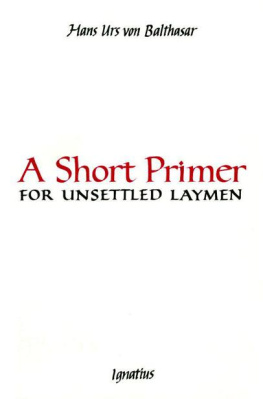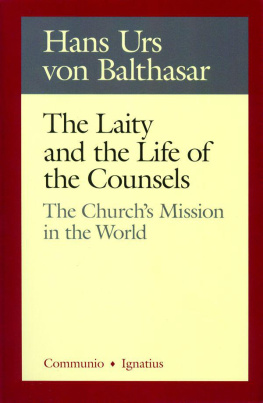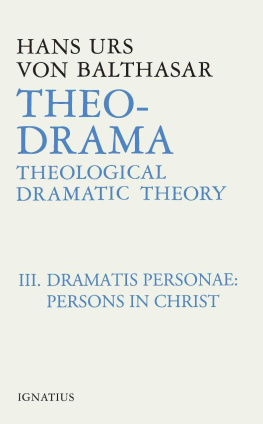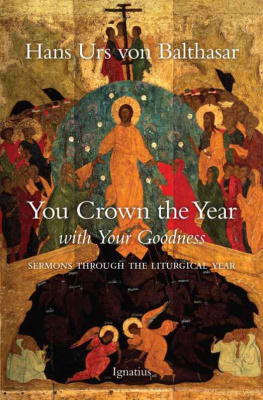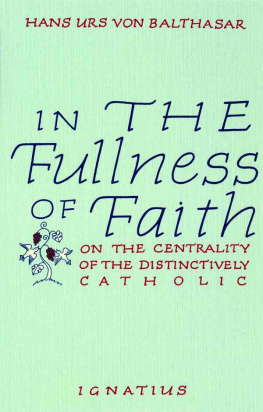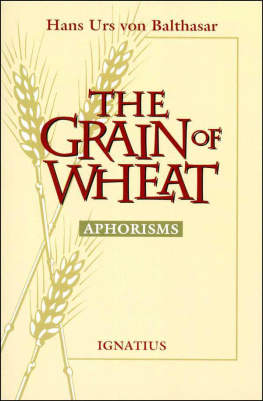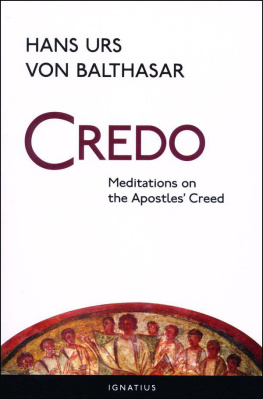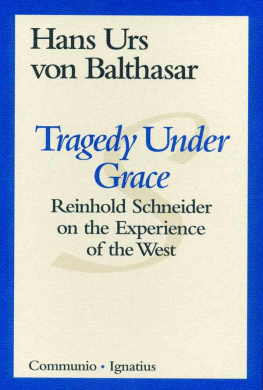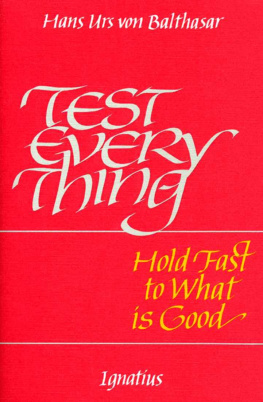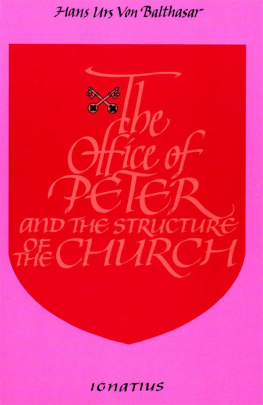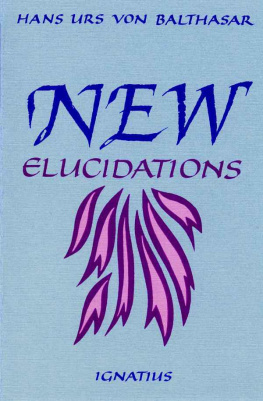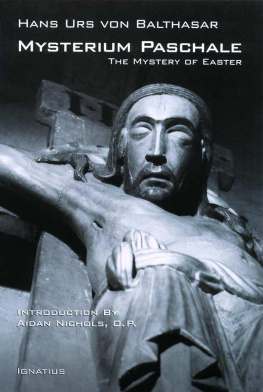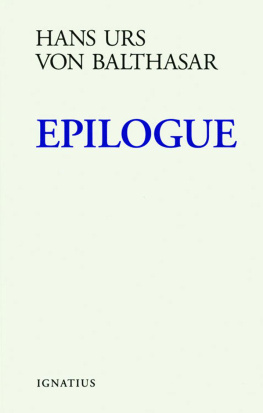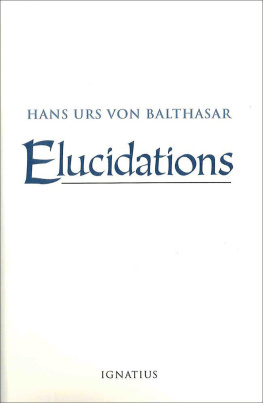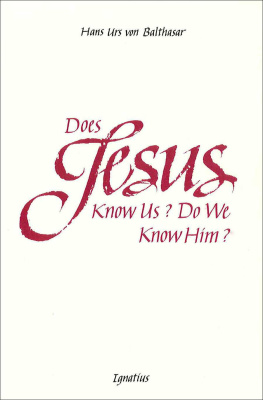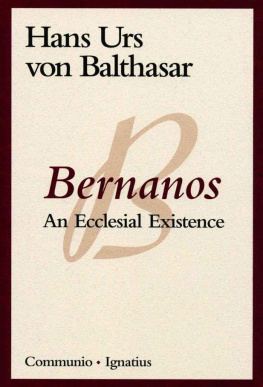Hans Urs von Balthasar - A Short Primer for Unsettled Laymen
Here you can read online Hans Urs von Balthasar - A Short Primer for Unsettled Laymen full text of the book (entire story) in english for free. Download pdf and epub, get meaning, cover and reviews about this ebook. year: 1985, publisher: Ignatius Press, genre: Religion. Description of the work, (preface) as well as reviews are available. Best literature library LitArk.com created for fans of good reading and offers a wide selection of genres:
Romance novel
Science fiction
Adventure
Detective
Science
History
Home and family
Prose
Art
Politics
Computer
Non-fiction
Religion
Business
Children
Humor
Choose a favorite category and find really read worthwhile books. Enjoy immersion in the world of imagination, feel the emotions of the characters or learn something new for yourself, make an fascinating discovery.
- Book:A Short Primer for Unsettled Laymen
- Author:
- Publisher:Ignatius Press
- Genre:
- Year:1985
- Rating:5 / 5
- Favourites:Add to favourites
- Your mark:
- 100
- 1
- 2
- 3
- 4
- 5
A Short Primer for Unsettled Laymen: summary, description and annotation
We offer to read an annotation, description, summary or preface (depends on what the author of the book "A Short Primer for Unsettled Laymen" wrote himself). If you haven't found the necessary information about the book — write in the comments, we will try to find it.
Hans Urs von Balthasar: author's other books
Who wrote A Short Primer for Unsettled Laymen? Find out the surname, the name of the author of the book and a list of all author's works by series.
A Short Primer for Unsettled Laymen — read online for free the complete book (whole text) full work
Below is the text of the book, divided by pages. System saving the place of the last page read, allows you to conveniently read the book "A Short Primer for Unsettled Laymen" online for free, without having to search again every time where you left off. Put a bookmark, and you can go to the page where you finished reading at any time.
Font size:
Interval:
Bookmark:
A Short Primer
for
Unsettled Laymen
Hans Urs von Balthasar
for
Unsettled Laymen
Translated by
Michael Waldstein
IGNATIUS PRESS SAN FRANCISCO
Title of the German original:
Kleine Fibel fr verumicherte Laien
1980 Johannes Verlag, Einsiedeln
Cover by Victoria Hoke Lane
With ecclesiastical approval
1985 Ignatius Press, San Francisco
Second printing 1987
All rights reserved
ISBN 978-0-89870-037-4
Library of Congress catalogue number 84-081790
Printed in the United States of America
This is a primer in which the children of God will find initially unfamiliar written signs for the sounds of faith with which they are familiar, signs that are intended to correspond to these sounds. By laymen we mean above all Catholic laymen.
The Lord advises Christians to remain simple in love, like children, for God revealed his mystery only to the simple, while the wise and clever (Jesus thanks him for this) do not grasp anything of that mystery. Children believe the stories they are told. They would be astonished, they would not even understand, if they were told that what they hear and repeat is a science and that the stories need not necessarily be true. The illiterate in the faith is usually more sure and unbiased than the literate, who always runs the danger of burdening others with the letter and pinning them down with it. Knowledge inflates, love builds up (1 Cor 8:1). What is inflated is hollow; what is built up remains.
But the unfortunate thing is that, with their supposed science, the wise and clever, often enough theologians, unsettle the simple. The latter feel in their correct instinct of faith that something is fishy, but they do not find the correct answer.
This is why Jesus speaks the frightening words about the millstone that is to be hung around the neck of the tempter of one of these little ones; this is why he threatens the blind leaders who lock the doors to the kingdom of heaven, do not enter themselves and deny the entrance to those who want to go in (Mt 23:13). They think themselves superior to the simple Christians but are not even able to distinguish anymore between worldly exercise of power ( kyrieuein : Lk 22:25) and the spiritual authority ( exousia : Mk 3:15) granted by Jesus to his disciples and those who take their place, an authority over the spirit that is against God, an authority to bind and loose on earth with effect in heaven. In being so scientific, they have become unable to believe in the Trinity or Christs divinity or his real presence in the Eucharist. Such things appear to them a party jargon (we are quoting); and that, dear Christian parents, is what they are teaching your children in the schools today.
Therefore the people who are unsettled, despite their good instinct, need to have a short primer placed in their hands so that they may find for their inner vision of Christian truth at least an outline of a few written signs which they can show to their tempters. Yet those whose eyes are simple and who are therefore completely in the light (Mt 6:22) should not disturb themselves by imagining that the scientific theologian knows more about the truths of faith than an upright Christian who seeks to live those truths day by day or that a biblical scholar understands Scripture better than a simple monk who has been meditating on it for years (P. Henrid). Nobody should suppose that he ought to embark on lengthy studies which he will scarcely be able to finish, in order to emerge at the other end of the dark tunnel into the daylight of simple faith, ora great dangerto get stuck in inflating half-knowledge. This primer may suffice as a first orientation.
Not everything that disturbs the unsettled will be dealt with but only the most urgent questions concerning the faith and its situation today. Questions on Christian morals cannot be clarified in such limited space because insight into the binding character of a moral norm depends largely upon how deeply a Christian has penetrated into the understanding of his faith. The fullness of faith in its unity must be experienced anew.
This little book addresses unsettled laymen. Is it too audacious to hope that some of those who have done the unsettling will also pick it up and let themselves be unsettled here and there in their settled self-confidence?
All true Catholic Christians suffer today from the confusion, within their Church. One can safely say that this unrest which followed the Council came mainly from the clergy and religious . By leaving their state of life in large numbers and by the secularization of the theology, catechesis and preaching that they practiced, they proved that they thoroughly misunderstood the opening of the Church to the world intended by the Council. Laymen, living and engaged in the world, did not need to feel addressed by this slogan as much. The increased apostolic commitment in the political, economic and social spheres that was demanded was nothing fundamentally new for them. But the shock to the clerical world could not remain without influence on the lay world. This influence became all the more confusing as perfectly normal conciliar reforms, such as that of the liturgy, were mixed upinextricably, for the laitywith innovations in statements of faith, catechesis, preaching and ecclesial practice which were most unworthy of belief and which the laity quickly recognized as unecclesial. These disorders were justified as legitimate by their authors in many ways and were cemented theoretically and practically, so that calls to order by higher authorities, if they came, generally died away without any effect.
This situation was made more severe by the massive appearance of a sort of intermediate state in the Church: the state of the (male) lay theologians . Without doubt, there were true laymen among them who wanted to give a better foundation to their service to the Church. But there were certainly just as many who would in earlier times have decided to become priests and who for this reason often enough harbored resentments against the clerical state and propagated its sociological and, as far as possible, theological secularization. A line of demarcation divides this state. Of course the state of lay theologians is powerful only in some countries, while in others it exists scarcely or not at all. In any case, the new phenomenon is a strong support for the trend toward blurring or completely abolishing the boundaries between the clerical state and the worldly lay state. The worker-priests, from different motives, had already pressed toward at least a temporary synthesis of the two forms of life. Now many clerics claim that they are undergoing an identity crisis and that they can no longer determine their place in modern society. Marriage appeared a place of refuge, all the more because it seemed that the increasing lack of priests could be eased by proven husbands and because women began to strive for the priesthood on the basis of their equality with men. Has not much of this been successfully practiced for a long time by the communi ties that split off from the Catholic Church? One can see that these are all clerical problems. One cannot say that the growing number of lay theologians has become the mouthpiece for the true concerns of the laity, which has been present in the Church since the beginning.
In some of its reforms, the Council lightened certain burdens. For example, it abolished mandatory abstinence on Friday, limited fasting and also simplified the liturgy. But this lightening of burdens was fused with a completely different lightening pushed through by the secularized clergy (always including a large number of religious) in the practical sphere (for example, the sacrament of confession was almost completely lost) and especially in the sphere of faith, where a small or large question mark was placed behind almost every article of the Creed. This fusion led to two grievous sociological-ecclesial facts .
Next pageFont size:
Interval:
Bookmark:
Similar books «A Short Primer for Unsettled Laymen»
Look at similar books to A Short Primer for Unsettled Laymen. We have selected literature similar in name and meaning in the hope of providing readers with more options to find new, interesting, not yet read works.
Discussion, reviews of the book A Short Primer for Unsettled Laymen and just readers' own opinions. Leave your comments, write what you think about the work, its meaning or the main characters. Specify what exactly you liked and what you didn't like, and why you think so.

